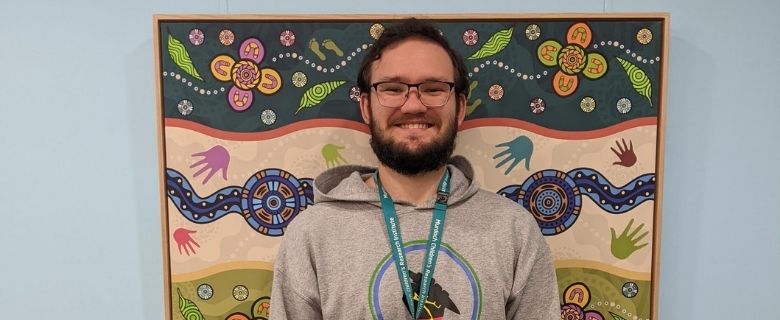Meet our brilliant minds: Jordan Gibbs

Tell us a little bit about yourself outside of MCRI?
I am a proud Peerapper / Anglo-Celtic man; my mob is from the North-West Coast of Tasmania. I was born and raised off country. I was born in Wagga Wagga on Wiradjuri land, before moving to Awabakal and Worimi Country around Newcastle on the Central Coast, where my father's family largely live. After some years there, I moved to Garramilla (Darwin) on Larrakia Country in the Northern Territory, where I lived until I graduated high school and came to Narrm (Melbourne) on Wurundjeri country to begin my studies in psychology. I have a wonderful partner, a fabulous dog, and I enjoy music, tabletop games, and being with my family and community.
What is your role at MCRI?
I wear four hats at the Murdoch Children's Research Institute. I am a research assistant with Dr Graham Gee in the Aboriginal health team, part of the Intergenerational health team. I am a sitting member of the Aboriginal Leadership team, where my focus is supporting the design and delivery of internally focused projects, including events like NAIDOC week and the Aboriginal Health Symposium. I am a member of the leadership team and subsequent working groups for the Stronger Futures Centre for Research Excellence as a scholar in Priority Area 4: Healing and Recovery from Complex Trauma. Finally, I support the Diversity and Inclusion Committee and sit on the Culture and Diversity sub-committee.
Tell us about your journey in getting to where you are today as a researcher here at MCRI?
My journey is one that is grounded in my learning and growth as an Aboriginal man, a budding critical thinker, and a lover of the diversity of the human experience. But in terms of my research career, I began in my undergraduate degree when I was offered a research assistant position at the Centre for Forensic Behavioural Science with Dr Justin Trounson. Under his mentorship, I began to explore culturally competent care provision and the facilitators of access and engagement for Aboriginal and Torres Strait Islander peoples across health and justice, including in mainstream disability service provision, the justice system, and secure settings. During my honours in psychology, I approached Dr Graham Gee to explore his work around cultural models of resilience. I utilised his model to explore Aboriginal and Torres Strait Islander student experiences of racism. Following that collaboration, I was offered a position by Dr Gee. I currently hold positions with both mentors and have the luxury of working across a significant span of work supporting the Aboriginal and Torres Strait Islander community research agenda in multiple spheres.
What research are you undertaking here at the MCRI, and what you are hoping to make possible for children & families through the work that you're doing?
My research with Dr Gee is focused on gathering the current evidence on how First Nation's peoples around the world and in Australia heal and recover from Childhood Sexual Abuse. This work is one of many projects being conducted under the banner of the Stronger Futures Centre for Research Excellence. This CRE brings together an extensive network of researchers, community members, industry and community partners, and scholars to create a network of collaboration. Through my work in the CRE, I hope that we can build a more robust understanding of the importance of culturally safe, grounded, and trauma-informed approaches in healing our diverse communities. Additionally, through our collaborative efforts researching and providing healing for individuals, families, and communities, we can break cycles of intergenerational trauma.
What excites you most about working in this field/child health?
I am excited by working in Aboriginal and Torres Strait Islander health because I get to explore healing from a whole of family and whole of community approach. I can work with my community to privilege Aboriginal and Torres Strait Islander voices and stories, facilitate their strengths, resilience, and capacity for change through self-determination. It is exciting to work in a team full of amazing people who care deeply about doing research well, with our stakeholders and participants at the front and centre of everything we do, and with their wellbeing always in mind.
Any career highlights?
My career is really in its infancy. I am currently undertaking a PhD in Clinical Psychology at the Swinburne University of Technology and in partnership with the Stronger Futures Centre for Research Excellence.
My PhD work, currently titled, 'A grounded theory to understand complex trauma, healing, and wellness for Aboriginal and Torres Strait Islander men who have experienced incarceration', aims to use a grounded theory and Indigenous research methodologies framework to explore the stories of Aboriginal and Torres Strait Islander men who are or have experienced incarceration. The study aims to understand how they stay strong and resilient, maintain wellness, and heal from complex trauma. This will be triangulated with stories from healers and other community members.



